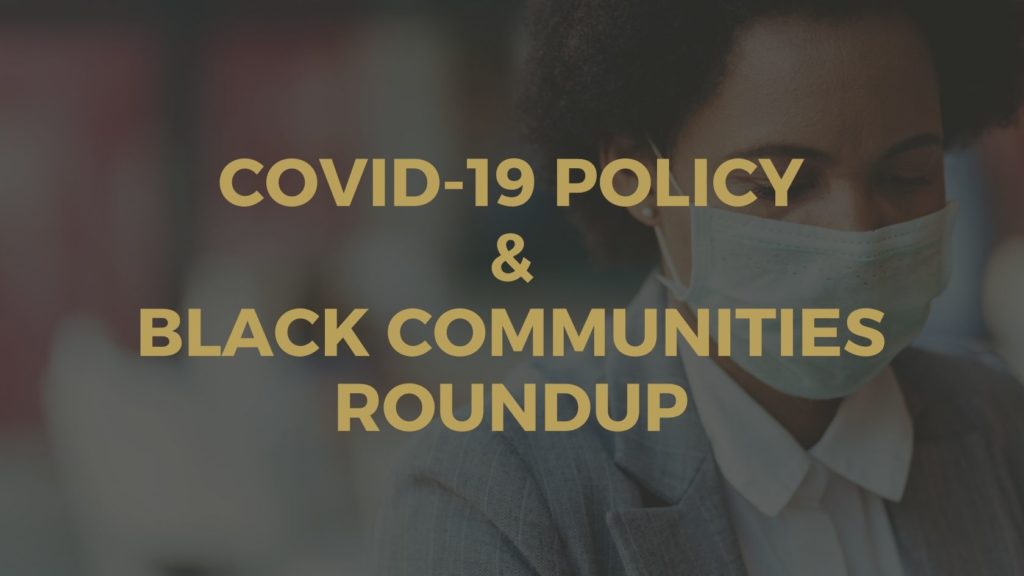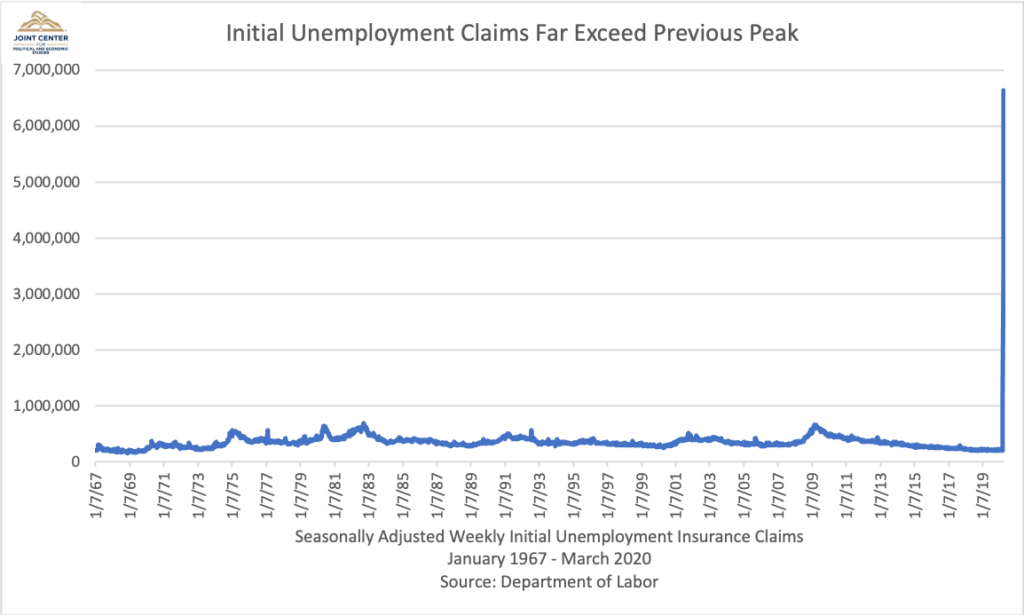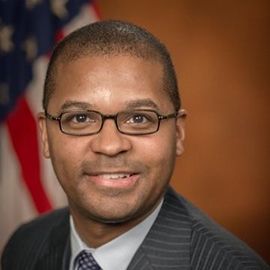Economic Policy

April 6 COVID-19 Policy & Black Communities Roundup
At the Joint Center, we’re monitoring the impact of COVID-19 and policy as they affect Black communities, and we’re collaborating with civil rights groups, community organizations, and others to analyze, strategize, and engage. Click here for our COVID-19 policy page, which is constantly updated.
Last week early data showed that COVID-19 has hit the health and economies of Black communities particularly hard. Unlike many other health issues, however, the federal government has not released racial data on COVID-19 cases and deaths. This week, the Joint Center is also examining how the digital divide is allowing some students to resume their schoolwork through distance learning, while preventing others from doing the same. Much more below.
-Spencer Overton, Joint Center President
Economic Studies & COVID-19
Last week, the COVID-19 pandemic and the related economic slowdown continued to devastate Black communities. In March, the Black unemployment rate rose from 5.8 percent to 6.7 percent. Nearly 1.4 million African Americans were looking for work, but unable to find a position. Unfortunately, this likely does not capture the extent of job loss in Black communities due to the economic slowdown thus far, and we should have a more complete picture when April’s numbers are released.
Overall, the Department of Labor Statistics reported 6.6 million initial unemployment insurance claims for the week ending March 28, which is just over twice as many as the previous week (3.3 million). Before COVID-19, the most initial claims in a week had been 695,000 in 1982. The racial breakdown of this data is not yet available.

Last week House Speaker Nancy Pelosi called for a fourth coronavirus relief bill to move right after Congress returns to DC on April 20, and this week House committee chairs are scheduled to send their plans for the next recovery package to the Speaker’s office. Senate Majority Leader Mitch McConnell indicated he wants to wait to see the effect of past relief legislation. The U.S. Department of Treasury announced The Paycheck Protection Program (“PPP”) which “will authorize up to $349 billion in forgivable loans to small businesses to pay their employees during the COVID-19 crisis,” and this week will continue to launch its implementation efforts of the most recent recovery package.
The video and audio recordings of the Joint Center’s online discussion with Congressional Black Caucus Chair Karen Bass and leading Black organizations on the benefits and shortcomings of past COVID-19 stimulus legislation are available here. A day after the Joint Center session with CBC Chair Bass, Congress passed the most recent stimulus legislation, the CARES Act. Click here for an analysis of which CBC priorities were included in the legislation (those highlighted in yellow).

On April 7, the Joint Center will convene several leading Black organizations for an online policy discussion with FCC Commissioner Geoffrey Starks on the impact of the racial digital divide on Black communities in the context of COVID-19. For example, some students are continuing their studies through distance learning, while others are not. The Commissioner’s New York Times op-ed on a connectivity stimulus is here. The full video of the discussion will be posted on our site.
On Friday, Joint Center President Spencer Overton and Committee for a Responsible Federal Budget President Maya MacGuineas joined The Atlantic for a live video discussion to explore the economic fallout of COVID-19. Spencer focused on the ramifications for communities of color.
The National Bar Association asserted that “COVID-19 is not an excuse for suspending federal civil rights protections,” and along with the National Urban League criticized the U.S. Department of Labor’s Office of Federal Contract Compliance Programs for using the “novel coronavirus outbreak” as a justification to exempt supply, service, and construction federal government contractors and subcontractors from compliance with federal affirmative action obligations.
HuffPost’s Taryn Finley wrote about how Black businesses are adapting to the coronavirus pandemic.
CityLab published an op-ed by Howard University Professor Natalie Hopkinson and Brookings Fellow Andre Perry titled “Black Businesses Left Behind in COVID-19 Relief.”
CNN published “Why the coronavirus crisis will expand America’s racial wealth gap.”
Baltimore Business Journal published “Viewpoint: Pandemic highlights importance of battling racial inequities in Baltimore’s workforce.”
Brookings fellow Andre Perry wrote “Black Americans were forced into social distancing long before the coronavirus.”
Economic Policy Institute’s David Cooper and Julia Wolfe wrote about the almost 20 million workers who are likely to be laid off or furloughed by July.
Brookings hosted webinars on COVID-19 last week, including Unemployment Insurance during the COVID-19 Pandemic: Reducing the Impact of this Economic Downturn and The Effects of the Coronavirus Outbreak on Marginalized Communities.
Political Studies & COVID-19
In “Early Data Shows African Americans Have Contracted and Die of Coronavirus at an Alarming Rate,” ProPublica reported that as of last Friday African Americans make up 26% of Milwaukee County’s population but 81% of its COVID-19 deaths, and 14% of Michigan’s population but 40% of its COVID-19 deaths. In a similar article on Saturday, “Coronavirus Hits Poor, Minority Communities Harder,” Axios explained that African Americans make up 33% of Charlotte, NC’s population but 44% of coronavirus cases, and 14.6% of Illinois’ population but 28% of confirmed cases.
In his New York Times op-ed “The Racial Time Bomb in the Covid-19 Crisis,” Charles M. Blow noted that of those who died in Italy from COVID-19, 75% had high blood pressure, 35% had diabetes, and a third heart disease. All three pre-existing conditions disproportionately affect African Americans.
Despite this early data, the federal government has not publicly reported COVID-19 cases and deaths by race. Several non-profit organizations (including the African American Mayors Association, the NAACP, and PolicyLink) and a group of Members of Congress (Representatives Robin Kelly and Ayanna Pressley, along with Senators Cory Booker, Kamala Harris, and Elizabeth Warren) sent letters urging the U.S. Department of Health and Human Services to collect and disclose data by race on COVID-19.
The Associated Press reported that Milwaukee’s Black community is being “hit hard by COVID-19 pandemic.”
PBS Wisconsin published “COVID-19 Threatens Black Communities on Milwaukee’s North Side.”
Milwaukee County knows that COVID-19 is threatening Black communities and can respond because—unlike the federal government and many other jurisdictions—Milwaukee County has adopted the best practice of tracking and disclosing demographic data (race, gender, age, municipality) on COVID-19 cases in real time.
Bridge Magazine also published an article explaining that Black communities in Michigan—not just Detroit—are being severely affected by COVID-19.
Detroit journalist Darren A. Nichols explains the human and community toll of deaths from COVID-19 in a New York Times op-ed “Detroit is Mourning.”
The Root’s Anne Branigin explained how and why Black communities are on the front line of the COVID-19 pandemic.
Slate published “How Racial Health Disparities Will Play Out in the Pandemic.”
The Atlantic published an article on how COVID-19 is uniquely affecting Southern states.
Advancement Project Board Member Jesse Williams recorded this video explaining the need for local jails to release low-level offenders who are being held and exposed to the coronavirus simply because they cannot afford to pay a $300 fine, and the Advancement Project hosted a webinar calling on the humane treatment of loved ones and community members inside prisons, jails, and immigration detention centers.
National Urban League President Marc Morial sent a letter to U.S. Commerce Secretary Wilbur L. Ross Jr. applauding the Census Bureau’s actions to “further suspend 2020 Census operations due to continued health concerns associated with the coronavirus.”
Based on a virtual town hall convened by Color of Change, MadameNoire published “5 Takeaways To Empower Black Communities From Color Of Change’s COVID-19 Town Hall.”
The Center for Urban and Racial Equity (CURE) launched the COVID-19 Equitable Response Community Commons featuring resources grounded in collective care, justice, power-building, and racial equity.
New America Indianapolis and The Indianapolis Recorder launched “COVID and the Black Community,” a weekly online community conversation series. Click here to watch the first session, which focuses on the importance of credible communication in times of crisis.

